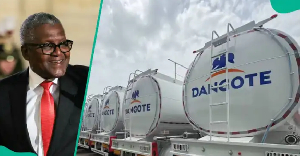The much-anticipated rollout of 4,000 CNG-powered trucks at the Dangote Refinery hit a roadblock on Friday, August 15, 2025, the D-day for nationwide fuel distribution.
The rollout plan, which marketers and analysts have said would reduce fuel prices by eliminating middlemen, could not take off due to glitches with Chinese logistics, affecting supply schedules.
Fuel distribution: 450 trucks received
According to reports, the 650,000 bdp-capacity refinery has only received 450 trucks so far, instead of the entire 4,000 fleet.
The initial plans of 600 will be surpassed by 150 more trucks that are expected to arrive at the Lekki-based refinery next week.
Punch quotes a top official at the Dangote Group as saying that a lack of ships to ferry the cars from China to Nigeria is the reason for the delay.
According to the official, there are not enough ships coming from China to handle the 4,000 trucks and tankers, hence the delay.
The official reportedly revealed that about 200 cars arrived on the first ship, while another 250 have been offloaded, stating that the firm expects 150 on the vessel next week.
Dangote Refinery is expecting more trucks
The hiccup comes following a widely circulated report that the plant will commence the nationwide fuel distribution on August 15, 2025.
Legit.ng reported that the refinery announced that it had started receiving the CNG-powered trucks.
The Vice President of Oil and Gas at Dangote Industries, Debakumar Edwin, said the first consignment of trucks recently left Apapa port and was received at the giant refinery at Lekki.
Dangote engages stakeholders
The Dangote Group reportedly held a high-level meeting with major industry players, including the National Association of Road Transport Owners (NARTO), and the Natural Oil and Gas Suppliers Association of Nigeria.
Insider reports said that the meeting was intended to douse the concerns about job losses following warnings by industry players that the refinery’s massive distribution plans could lead to job cuts and disruption in the current fuel distribution network in Nigeria.
The meeting explained the plans of the facility to protect the marketers’ role, including tanker drivers, while reducing concerns of widespread displacement in the industry.
Experts have said that despite the delay, the refinery is dedicated to its ambitious plan to deploy 4,000 CNG trucks throughout Nigeria.
The plan will reduce yearly fuel distribution expenses by about N1.7 billion and improve supply efficiency.
Fuel distribution: Why 4,000 trucks?
The refinery sees the plan as a cost-saving measure and an environmentally friendly initiative.
According to the report, the vehicles are estimated to save about 40% in distribution costs while cutting carbon emissions, aligning with the company’s global energy transition plans.
The CNG adoption marks a significant milestone for Nigeria’s petroleum industry.
The refinery aims to stabilise the volatile fuel prices, logistics and reduce Nigeria's reliance on diesel-powered trucks, which are expensive to operate and environmentally destructive.
Business News of Monday, 18 August 2025
Source: www.legit.ng













